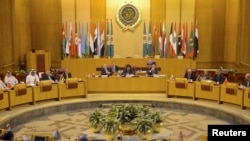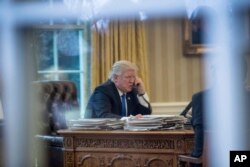Criticism of President Donald Trump's reported plan to recognize Jerusalem as Israel's capital is pouring in from across the Middle East, Europe and around the world.
One of the strongest statements of opposition to such a plan came from key NATO ally Turkish President Recep Tayip Erdogan Tuesday.
Erdogan told a parliamentary group meeting of his ruling Justice and Development Party (AKP), "This could go as far as cutting our diplomatic relations with Israel. You cannot take such a step."
He described Jerusalem as a "red line" for Muslims and said Ankara would take measures in the event of a possible U.S. move, including convening the Organization of Islamic Cooperation in Istanbul. Such recognition by the U.S. not only would be a violation of international law but also would be "a big blow to the conscience of the humanity," Erdogan said. He warned of serious diplomatic consequences if Washington proceeded with the move.
Israeli officials in turn criticized Erdogan's remarks. The Israeli newspaper Haaretz quoted a senior Israeli official as saying, "Jerusalem has been the Jewish capital for 3,000 years and the capital of Israel for 70 years, whether Turkish President Erdogan recognizes it as such or not."
The status of Jerusalem is at the epicenter of the Israeli-Palestinian conflict, with the Palestinians backed by the rest of the Arab and Islamic world. Israel regards the entire city as its indivisible capital, while the Palestinians claim East Jerusalem as the capital of a future state.
'Grave consequences'
Palestinian President Mahmoud Abbas has asked other world leaders to intervene, saying "such a U.S. decision would destroy the peace process." In his phone call with Trump, Abbas said he relayed to the U.S. president "the grave consequences of moving the U.S. Embassy to Jerusalem or making any announcement that alters the long-held U.S. policy regarding Jerusalem."
Jordan warned of "grave consequences," and close Trump ally Saudi Arabia expressed hope that the United States would not recognize Jerusalem as the capital of Israel. The Saudi state news agency SPA quoted an unnamed official at the Saudi Foreign Ministry:
"The recognition will have very serious implications and will be provocative to all Muslims' feelings."
The announcement on Jerusalem could take place in a planned speech by Trump on Wednesday, while Secretary of State Rex Tillerson is on a trip abroad, meeting with EU and NATO officials in Brussels.
European Union foreign policy chief Federica Mogherini said Tuesday, "A way must be found through negotiations to resolve the status of Jerusalem as the future capital of both states, so that the aspiration of both parties can be fulfilled."
Tillerson ignored a shouted question from a reporter about whether U.S. diplomats would still be safe around the world if the embassy moved to Jerusalem. The State Department also has been quiet on the issue of the possible need to issue security warnings to U.S. diplomatic personnel in the Middle East and Islamic countries.
In a security message Tuesday, the U.S. Consulate General in Jerusalem restricted American government workers and their families from personal travel in Jerusalem's Old City and West Bank, to include Bethlehem and Jericho, amid widespread calls for demonstrations on Wednesday.
'Day of rage'
Palestinian factions and militant groups already were calling for a "day of rage" Wednesday against the possible U.S. decision to recognize Jerusalem as Israel's capital.
In Gaza City, Talal Abu Zarefa, Democratic Front for the Liberation of Palestine leader, said, "We must strengthen the popular movement, which is rejecting this policy, and it is necessary to express the unity of the Palestinian people in Gaza, the West Bank, the 48 regions and the refugee camps in order to emphasize that Jerusalem is a red line and it's a capital of the Palestinian state, and we cannot accept in any way any harm to Jerusalem city."
Iraqi Prime Minister Haider al-Abadi on Tuesday voiced his opposition to U.S. recognition of Jerusalem as the Israeli capital.
"The Iraqi cabinet vehemently rejects this step and expresses deep concern over such step, and over moving the United States Embassy in Israel to Jerusalem," Abadi said. "The Iraqi government strongly warned of the decision fallout and ramifications. This move would unleash turmoil in the region and the world alike."
While Trump is not expected to move the U.S. Embassy from Tel Aviv to Jerusalem now, U.S. administration officials say recognizing Jerusalem as Israel's capital would show his resolve to do it eventually. During the 2016 presidential campaign, Trump had promised to move the embassy to Jerusalem.
VOA's Turkish service, Robert Berger and Dorian Jones contributed to this report.






